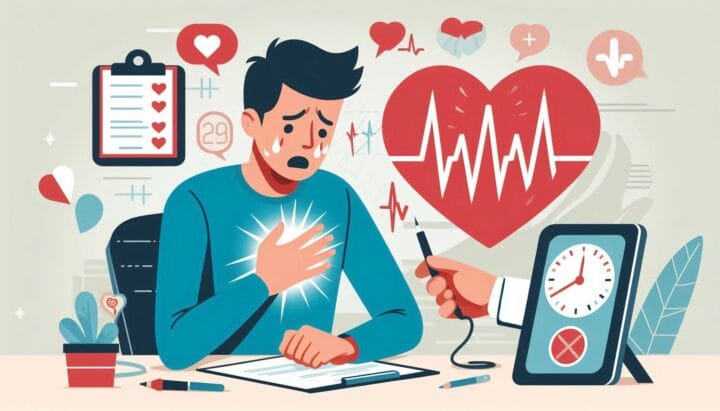Anxiety Heart Palpitations: Causes, Symptoms, and Solutions
Table of Contents

Anxiety Heart Palpitations: Causes, Symptoms, and Solutions
Ever felt your heart doing a drum solo in your chest for no apparent reason? Welcome to the world of anxiety heart palpitations. It’s like your heart decided to audition for a rock band without telling you first. But don’t worry, you’re not alone in this cardiac concert. Let’s dive into the whys and hows of anxiety heart palpitations and figure out how to turn down the volume on this unwanted performance.
The Anxiety-Heart Connection: A Complicated Tango
Anxiety and your heart are like two dancers in a complicated tango. One leads, the other follows, but sometimes it’s hard to tell which is which. This dance can leave you feeling breathless, and not in a good way.
What Exactly Are Anxiety Heart Palpitations?
Think of anxiety heart palpitations as your heart’s way of freaking out. It might feel like it’s:
- Racing faster than Usain Bolt
- Fluttering like a butterfly
- Pounding like a bass drum
- Skipping beats like a broken record
It’s your body’s alarm system going off, even when there’s no real fire to put out.
The Science Behind the Sensation
Let’s get a bit nerdy for a moment. When anxiety hits, your body goes into fight-or-flight mode. It’s like your internal DJ suddenly switches from chill beats to intense techno. Your heart rate increases, your breathing quickens, and your muscles tense up.
The Hormone Havoc
Anxiety triggers a hormone party in your body, and everyone’s invited:
- Adrenaline: The life of the party
- Cortisol: The party planner who won’t let things calm down
These hormones are great when you need to run from a bear, not so great when you’re just trying to give a presentation at work.
Symptoms: More Than Just a Racing Heart
Anxiety heart palpitations come with a whole menu of unpleasant side dishes:
- Chest tightness (like someone’s sitting on your chest)
- Shortness of breath (as if you’ve just run a marathon)
- Dizziness (the room’s spinning, but you’re standing still)
- Sweating (personal rain cloud, anyone?)
It’s like your body’s throwing a party you never asked for.
Triggers: What Sets Off This Cardiac Carnival?
Identifying your triggers is like finding the DJ booth at this unwanted party. Common triggers include:
- Public speaking (aka voluntary torture)
- Job interviews (because they weren’t stressful enough already)
- Relationship issues (heart problems of a different kind)
- Financial stress (when your wallet and your heart are both feeling the pinch)
The Vicious Cycle: When Worry Feeds Itself
Here’s where things get tricky. You start worrying about your heart palpitations, which causes more anxiety, which causes more palpitations. It’s like a dog chasing its tail, but the dog is your anxiety and the tail is your poor, confused heart.
Breaking the Loop
To break this cycle, try:
- Acknowledging the palpitations
- Reminding yourself they’re harmless
- Focusing on something else
It’s like telling your anxiety, “Thanks for trying to protect me, but I’ve got this.”
Coping Strategies: Turning Down the Volume
Now, let’s talk about how to lower the volume on this cardiac concert:
1. Deep Breathing: The Reset Button
Try the 4-7-8 technique:
- Inhale for 4 counts
- Hold for 7 counts
- Exhale for 8 counts
It’s like hitting the reset button on your nervous system.
2. Progressive Muscle Relaxation: The Full-Body Chill
Start at your toes and work your way up, tensing and then relaxing each muscle group. It’s like giving your body a massage from the inside out.
3. Mindfulness: Becoming a Thought Traffic Cop
Observe your thoughts without judgment. Let them pass by like cars on a highway. You’re not driving the cars, you’re just watching them go by.
When to Seek Help: Don’t Go It Alone
While anxiety heart palpitations are usually harmless, sometimes you need backup. It’s time to call in the pros if:
- Palpitations are frequent or severe
- You have a history of heart problems
- Palpitations come with chest pain or fainting
Remember, asking for help is a sign of strength, not weakness.
The Future Forecast: Hope on the Horizon
Managing anxiety heart palpitations is possible. With the right strategies and support, you can turn down the volume on this unwanted heart concert:
1. Therapy: The Mind Mechanic
Cognitive Behavioral Therapy (CBT) can help you reframe your thoughts about palpitations. It’s like getting a tune-up for your brain.
2. Medication: The Chemical Balancer
In some cases, medication might be necessary. It’s not a magic pill, but it can be a helpful tool in your anxiety-fighting toolkit.
3. Lifestyle Changes: The Long Game
Regular exercise, a healthy diet, and good sleep habits can all contribute to reducing anxiety and its physical symptoms. It’s like giving your body and mind the best fuel to run smoothly.
Conclusion
Anxiety heart palpitations can feel scary, but they’re usually more of a nuisance than a danger. By understanding the connection between anxiety and your heart, recognizing your triggers, and arming yourself with coping strategies, you can turn down the volume on this unwanted cardiac concert. Remember, you’re not alone in this experience, and there’s always hope for calmer days (and calmer heartbeats) ahead. Don’t hesitate to reach out for professional help if you need it. Your heart and your mind will thank you.
FAQs
- Can anxiety heart palpitations cause a heart attack?
While they can feel scary, anxiety-induced palpitations don’t typically lead to heart attacks. However, if you have concerns, it’s always best to consult a healthcare professional. - How long do anxiety heart palpitations usually last?
They can last from a few seconds to several minutes. If they persist for an extended period or occur frequently, consult a doctor. - Can children experience anxiety heart palpitations?
Yes, children can experience anxiety and its physical symptoms, including heart palpitations. If you notice this in a child, it’s important to seek professional guidance. - Are there any foods that can trigger anxiety heart palpitations?
Caffeine, alcohol, and high-sugar foods can potentially trigger or worsen palpitations in some people. Everyone’s triggers can be different, so pay attention to what affects you. - Can exercise help reduce anxiety heart palpitations?
Regular exercise can help reduce overall anxiety and improve heart health. However, always consult with a healthcare provider before starting a new exercise regimen, especially if you have heart concerns.
Citations:
[1] https://my.clevelandclinic.org/health/diseases/21677-heart-palpitations-and-anxiety
[2] https://healthmatch.io/anxiety/how-to-manage-anxiety-heart-palpitations
[3] https://www.mayoclinic.org/diseases-conditions/heart-palpitations/symptoms-causes/syc-20373196
[4] https://www.medicalnewstoday.com/articles/anxiety-with-heart-palpitations
[5] https://my.clevelandclinic.org/health/diseases/17084-heart-palpitations
[6] https://www.mhs.net/blog/2024/02/anxiety-and-heart-problems-6-signs-of-arrhythmias
[7] https://www.psychiatry.org/patients-families/anxiety-disorders/what-are-anxiety-disorders
[8] https://www.webmd.com/heart-disease/atrial-fibrillation/anxiety-afib














Post Comment